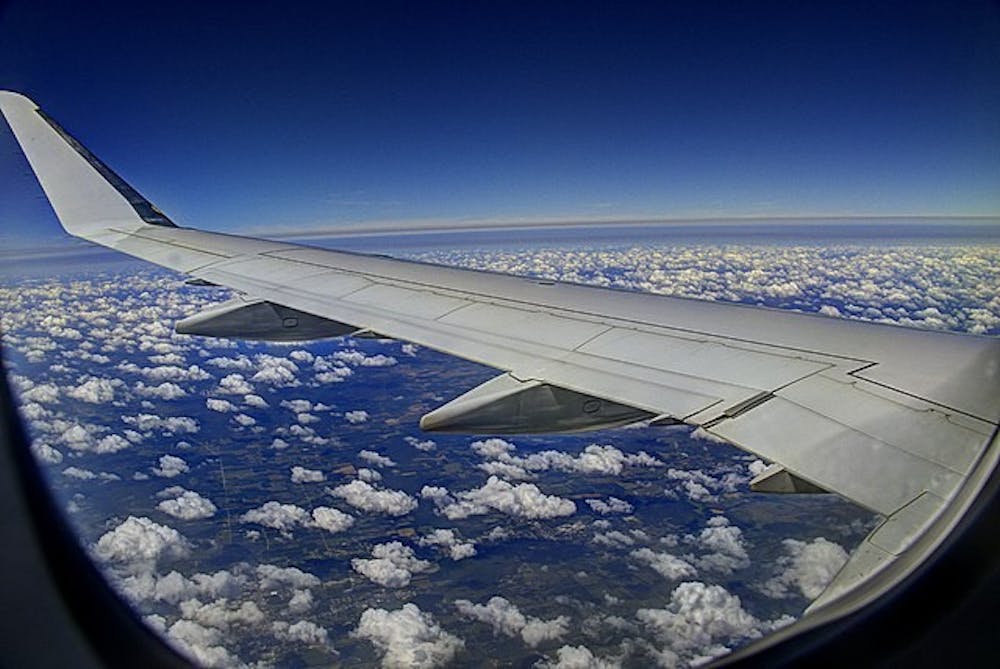Like most kids, when I was younger I dreamed of having a private jet. I thought it would be the neatest thing, to own something that exudes power, status and wealth — or perhaps that it could take me to Disney World whenever I wished. Now, at my ripe age of 21, a harsh reality has replaced that dream. While celebrities — and others fitting into their economic class — are parading around on private jets, the rest of the world is left to deal with the harsh environmental consequences — intensifying natural disasters, increasing global temperature and rising sea levels to list a few. We must hold those who participate in the private jet industry accountable by taking staunch advocacy efforts and governmental action against them.
The sustainability marketing agency Yard recently released a study highlighting the “top celebrity private jet offenders'' of the year and the effects of their ludicrous carbon emissions. Yard’s data originates from the Twitter page “Celebrity Jets,” which is run by University of Central Florida student Jack Sweeney. Sweeney first gained attention in 2020 after publicizing Elon Musks’ flight paths, which Musk soon after demanded to be taken down.
Per the study, Taylor Swift’s flight emissions slide in at first place, emitting 1,184.8 times more carbon dioxide than the average individual. She sits in good company with public figures like Kylie Jenner, Drake and Jay-Z — though only metaphorically speaking, as they all seem to prefer private transportation. Though there is a range among each celebrity’s carbon footprint, they should be held to the same level of scrutiny for their reckless actions as they all further the effects of global warming. Data show that, on average, celebrities produce 482 times more carbon emissions than regular people. Even more, these jet trips are as short as 10 minutes. And while a flight may be just 10 minutes in the air, their emissions add up and account for 50 percent of aviation emissions worldwide.
Simply put, private jet usage kills the environment — one study notes private jet carbon emissions are five to 14 times more polluting than commercial planes. These carbon emissions directly contribute to global warming, and the long-lasting effects that come with it. Scientists suggest in the following years temperatures and sea level will rise exponentially, natural disasters will intensify and ice caps will become a thing of the past. Non-CO2 climate impacts, like contrail cloud formation, also play a major role in global warming. Contrail clouds are the lines of clouds left behind by jet planes, and they contribute two times as much to global warming as aircraft emissions. This disheartening slew of climate implications shows that even in the face of a global crisis, private jet users are unable to recognize and remedy their wrongdoings.
While we have already begun to experience climate change today, it is not too late to mitigate its effects for our future. Scientists across the globe are working on solutions to address the problems created by the aviation industry. Some solutions include switching aircrafts to sustainable advanced fuels and manufacturing new zero-emission aircrafts. In addition to long-term sustainability measures, there are steps the government must take to address this issue. One example of this is to regulate private jet use by employing a fuel tax — doing so would additionally incentivize individuals to instead seek group transportation methods, or not fly at all. These are feasible items that must be explored in order to help tear down the societal acceptance of frequent private jet usage.
The general public must also act by way of educating themselves on the environmental impacts of private jet usage. Also, it is imperative we recognize which of our favorite celebrities — or friends — excessively participate in this harmful practice and vocalize our distaste with the threat of losing our support. Celebrity fame is contingent upon fans — to blindly support such individuals is to condone their reckless behavior. While it might be hard to see now, they are continually putting the well-being of you, your legacy and the planet at risk. No amount of fame, or money at that, should exempt them from the moral obligation of not endangering others.
It is long overdue that private jet users are held accountable by both the government and the public. We all live on earth — we should all act like we want to keep living here. No longer can we sit idly by as forests burn, towns flood and ice caps disappear — the sake of the entire world is quite literally at stake. Swift, concrete action is needed to alleviate this. Here at the University, this could be as big as taking environmentally-focused classes and joining sustainability groups, and as small as simply having a conversation with friends to platform these issues. We know all too well what will happen if we don’t.
Grace Duregger is an Opinion Senior Associate for The Cavalier Daily. She can be reached at opinion@cavalierdaily.com.
The opinions expressed in this column are not necessarily those of The Cavalier Daily. Columns represent the views of the authors alone.







